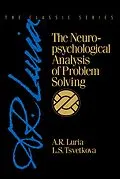For any of us, problem solving is a daily event. For some, it is a major task. This historical book puts to use neuropsychological methods to analyze the process of problem solving. Experience shows that the process is psychologically so complicated that standard methods established in pedagogy and psychology are insufficient to precisely determine individual factors hindering effective problem solving. The authors present techniques for rehabilitation training which could compensate for the impairments observed in individual cases. Luria's work has transformed rehabilitation training, enabling the evaluation of rehabilitation principles and methods. Luria's thinking and conceptual style reflect his genius and rich understanding of brain-behavior relationships. As those who have read it agree, Luria demonstrates remarkable insight with his complex analysis and his qualitative analysis is ""breathtaking.
Autorentext
A.R. Luria, L.S. Tsvetkova
Inhalt
Table of Contents, To the American Reader, Foreword, Editor's Note, Chapter 1 The Problem and Clinical Methodology, Chapter 2 Impairments of Problem Solving with Lesions of the Parietal-Occipital Brain Areas, Chapter 3 Disorders of Problem Solving in Cases of the Basal-Frontal Syndrome, Chapter 4 Impairments of Problem Solving with Posterior Frontal Syndrome, Chapter 5 Disorders of Problem Solving in the Development of the Massive Frontal Syndrome, Chapter 6 Impairments in Problem Solving with Atrophy of the Left Frontal Lobe, Chapter 7 Disorders of Problem Solving with Indistinct Frontal Lobe, Chapter 8 Disorders of Problem Solving with Secondary Frontal Syndrome, Chapter 9 Experiments in Rehabilitation Training: Problem Solving Strategies in Patients with the Frontal Syndrome, Chapter 10 Disorders in Problem Solving in Local Brain Lesions, References, Additional Sources
